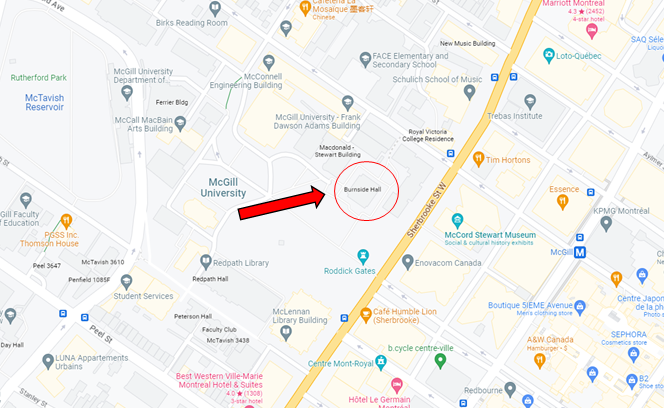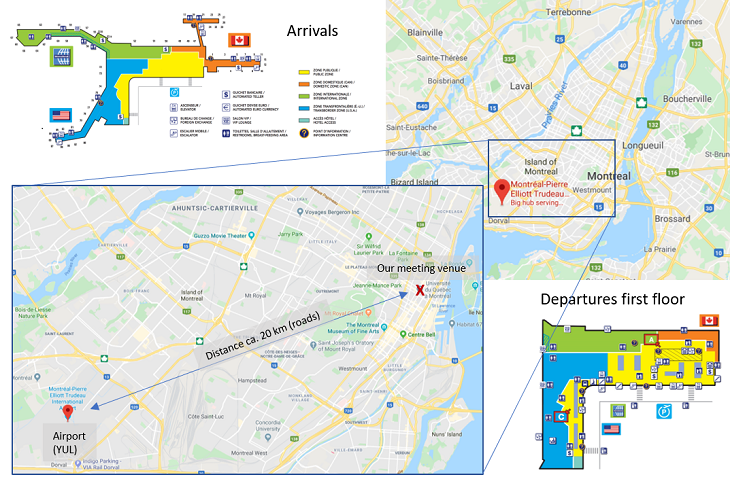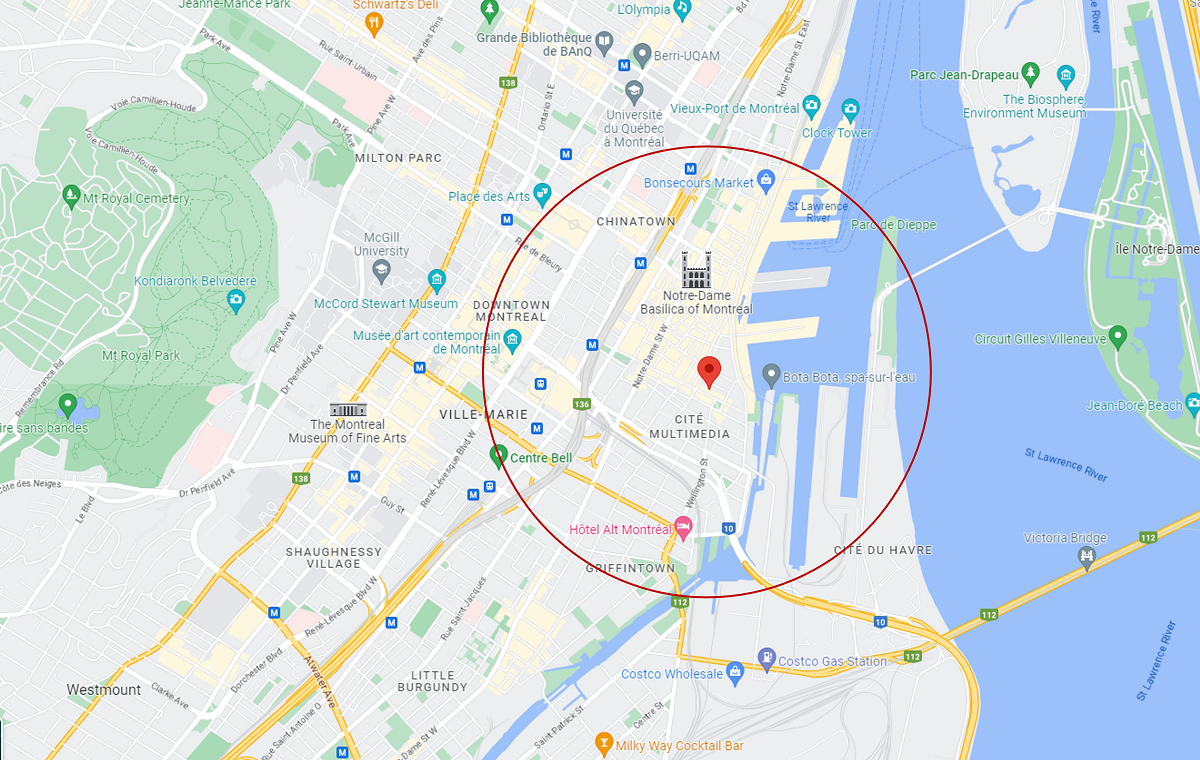COSS-TT International Coordination Meeting (9) – May 2023

+++++ NEWS+++++ VENUE CHANGE +++++NEWS+++++
Due to unforeseen circumstances the meeting venue has changed to McGill University.
Please find more info under the venue, accommodation and transport tab
The COSS-TT (9) International Coordination Meeting will provide a first opportunity for COSS-TT members and the COSS community to meet again in person after a long period of travel restrictions due to Covid-19.
COSS-TT (9) will be a hybrid meeting with strong emphasis on in-person attendance and only limited options for online participation.
The TT is focussing on coastal ocean physics and interactions between physical and biogeochemical processes, but has also close ties with other OceanPredict Task Teams and other international and intergovernmental organisations.
Meeting objectives
- Restore and re-enforce international links between coastal ocean modelers through in-person communication
- Review advances in the coastal ocean forecast systems development and implementation
- Review new science in support of COSS (see themes)
- Discuss how the TT could act more decisively towards international coordination and cooperation in coastal ocean forecasting (esp. between in-person meetings)
- Discuss collaboration with UN Decade Programmes and Decade Collaborative Centers
The detailed agenda for the COSS-TT meeting now available, including poster information.
A general agenda overview for all 3 meeting days is provided below:
| Day 1 | Tuesday, 2nd May 2023 | Chairs/rapporteurs |
|---|---|---|
| 8:30 – 9:00 | Arrival and registration | Local hosts |
| 9:00 – 9:40 | Welcome, introduction and objectives | Greg Smith, Pierre De Mey-Frémaux, Villy Kourafalou and Alex Kurapov |
| 9:40 – 10:40 | Session 1: Science in support of Coastal Ocean forecasting – Part 1 | TBC |
| 10:40 – 11:10 | Coffee break | |
| 11:10 – 12:25 | Session 1: Science in support of Coastal Ocean forecasting – Part 2 | TBC |
| 12:25 – 14:00 | Lunch break | |
| 14:00 – 15:30 | Session 1: Science in support of Coastal Ocean forecasting – Part 3 | TBC |
| 15:30 – 16:00 | Coffee break | |
| 16:00 – 17:15 | Session 2: Coastal and Regional (pre-)operational ocean forecasting systems and applications – Part 1 | TBC |
| Day 2 | Wednesday, 3rd May 2023 | |
|---|---|---|
| 9:00 – 9:05 | Short intro to day 2 | Pierre De Mey-Frémaux, Villy Kourafalou and Alex Kurapov |
| 9:05 – 10:05 | Session 2: Coastal and Regional (pre-)operational ocean forecasting systems and applications – Part 2 | TBC |
| 10:05 – 10:35 | Coffee break | |
| 10:35 – 12:15 | UN Decade session | TBC |
| 12:15 – 14:15 | Lunch break & group photo | |
| 14:15 – 15:30 | Session 2: Coastal and Regional (pre-)operational ocean forecasting systems and applications – Part 3 | TBC |
| 15:30 – 16:00 | Coffee break | |
| 16:00 – 17:30 | COSS-TT business meeting | Pierre De Mey-Frémaux, Villy Kourafalou and Alex Kurapov |
| Evening (time tbc) | COSS-TT meeting dinner |
| Day 3 | Thursday, 4th May 2023 | |
|---|---|---|
| 9:00 – 9:05 | Short intro to day 3 | Pierre De Mey-Frémaux, Villy Kourafalou and Alex Kurapov |
| 9:05 – 10:50 | Session 3: Seamless integration between Coastal and Regional systems (R/COFS under COSS-TT) and Large scale systems (LOFS under OceanPredict) | TBC |
| 10:50 – 11:20 | Coffee break | |
| 11:20 – 12:30 | Session 4: Synergy between altimetry and modelling in coastal regions | TBC |
| 12:30 – 14:00 | Lunch break | |
| 14:00 – 15:15 | Session 5: Machine Learning | TBC |
| 15:15 – 15:45 | Coffee break | |
| 15:45 – 16:25 | Closing session : Summaries by session chairs/rapporteurs and closing remarks | Session chairs and rapporteurs |
The themes covered by this meeting are listed below.
When submitting an abstract please match it to one or more of these themes. The registration and abstract submission form will provide for this.
Theme 1 – Science in support of Coastal Ocean forecasting: scientific advances in Coastal and Regional Ocean Forecasting Systems (R/COFS), including process understanding and interactions (land-sea, atmosphere-ocean and currents-waves), model evaluation, probabilistic approaches and observing system evaluation (such as Observing System Simulation Experiments).
Theme 2 – Coastal and Regional (pre-)operational ocean forecasting systems and applications: system descriptions and updates; requirements for real-time operations and forecasts (incl. model details, open boundary conditions, river outflow, atmospheric forcings); assimilation and verification in those systems; coastal forecasting system applications, user- and citizen-oriented products and uptake in coastal regions.
Theme 3 – Seamless integration between Coastal and Regional systems (R/COFS under COSS-TT) and Large scale systems (LOFS under OceanPredict): nesting and downscaling, comparison of solutions of nested (R/COFS) and outer (LOFS) models over the same domain, advances in seamless integration of systems and demonstration of value added through one-way and two-way nesting.
Theme 4 – Synergy between altimetry and modelling in coastal regions: up-to-date and future altimeter products presentation; connectivity with in-situ; data assimilation and modelling use cases for regional/coastal oceans; coastal/off-shore signal continuity.
Special theme 5 – Machine Learning: ML contributions to regional and coastal data analysis and forecasting
| 21 (no of COSS-TT members) |
35 (no of in-person attendance) |
||||
| No | First name | Surname | Affiliation | COSS-TT member | In-person? |
|---|---|---|---|---|---|
| 1 | Alessandro | Aguiar | State University of Rio de Janeiro | 0 | 0 |
| 2 | Enrique | Alvarez Fanjul | Mercator Ocean International | 1 | 0 |
| 3 | Heather | Andres | DFO | 0 | 0 |
| 4 | Yannis | Androulidakis | Aristotle University of Thessaloniki | 0 | 0 |
| 5 | Eric | Bayler | NOAA/NESDIS/Center for Satellite Applications & Research (STAR) | 0 | 1 |
| 6 | Jean-Marc | Belanger | ECCC | 0 | 0 |
| 7 | Corinne | Bourgault-Brunelle | DFO-ECCC | 0 | 1 |
| 8 | Steve | Brenner | Bar Ilan University | 0 | 1 |
| 9 | Theo | Brivoal | Mercator Ocean / CNRM | 0 | 0 |
| 10 | Kemal | Cambazoglu | The University of Southern Mississippi | 0 | 0 |
| 11 | Francisco | Campuzano | +ATLANTIC CoLAB | 0 | 0 |
| 12 | Kuo-Hsien | Chang | ECCC | 0 | 1 |
| 13 | Kamel | Chikhar | ECCC | 0 | 0 |
| 14 | Byoung-Ju | Choi | Chonnam National Univeristy, Korea | 1 | 1 |
| 15 | Mauro | Cirano | Federal University of Rio de Janeiro | 1 | 1 |
| 16 | Giovanni | Coppini | CMCC – EuroMediterranean Center on Climate Change | 0 | 0 |
| 17 | Tomasz | Dabrowski | Marine Institute | 0 | 1 |
| 18 | Pierre | De Mey-Fremaux | CNRS/LEGOS | 1 | 1 |
| 19 | Michael | Dunphy | DFO-ECCC | 0 | 1 |
| 20 | Frederic | Dupont | ECCC | 0 | 1 |
| 21 | Christopher | Edwards | University of California, Santa Cruz | 1 | 1 |
| 22 | Amina | El Kasmi | ECCC | 0 | 0 |
| 23 | Tal | Ezer | Old Dominion University | 0 | 1 |
| 24 | Giles | Fearon | University of Cape Town, South Africa & South African Environmental Observation Network (SAEON) | 0 | 1 |
| 25 | Ivan | Federico | CMCC – EuroMediterranean Center on Climate Change | 1 | 0 |
| 26 | Cristina | Forbes | United States Coast Guard | 0 | 1 |
| 27 | Yosuke | Fujii | JMA/MRI | 0 | 0 |
| 28 | Jianping | Gan | The Hong Kong University of Science and Technology | 1 | 0 |
| 29 | Marcos | Garcia Sotillo | Nologin / NOW (Nologin Ocean Weather systems) | 1 | 1 |
| 30 | Audrey-Anne | Gauthier | ECCC | 0 | 1 |
| 31 | Merrick | Haller | Oregon State University | 0 | 1 |
| 32 | Mike | Herzfeld | CSIRO | 1 | 0 |
| 33 | Naoki | Hirose | RIAM, Kyushu University | 1 | 1 |
| 34 | Joanne | Hopkins | NOC | 0 | 0 |
| 35 | Rachel | Horwitz | Bedford Institute of Oceanography, Fisheries and Oceans Canada | 0 | 1 |
| 36 | Oleksandr | Huziy | ECCC | 0 | 1 |
| 37 | Colette | Kerry | UNSW Australia | 0 | 0 |
| 38 | Vasily | Korabel | Danish Meteorological Institute | 0 | 1 |
| 39 | Villy | Kourafalou | University of Miami | 1 | 1 |
| 40 | Marios | Krestenitis | Center for Research and Technology Hellas, Information Technologies Institute, Greece | 0 | 0 |
| 41 | Yannis | Krestenitis | School of Civil Engineering, AUTh | 0 | 0 |
| 42 | Alexander | Kurapov | NOAA/NOS/OCS/CSDL/CMMB | 1 | 1 |
| 43 | Laura Mine Choo | Lam Ming Kan | ECCC | 0 | 0 |
| 44 | Yvonnick | Le Clainche | DFO-ECCC | 0 | 1 |
| 45 | Pierre Yves | Le Traon | Mercator Ocean International | 1 | 0 |
| 46 | Ji | Lei | DFO-ECCC | 0 | 1 |
| 47 | Bruno | Levier | Mercator Ocean International | 1 | 0 |
| 48 | Christos | Makris | Research Associate, School of Civil Engineering, Aristotle University of Thessaloniki | 0 | 0 |
| 49 | Kristian | Mogensen | ECMWF | 0 | 0 |
| 50 | Saeed | Moghimi | NOAA/UCAR | 0 | 0 |
| 51 | Baptiste | Mourre | SOCIB | 0 | 0 |
| 52 | Lars | Nerger | Alfred-Wegener-Institut (AWI) | 0 | 0 |
| 53 | Paolo | Oddo | UniBo | 1 | 0 |
| 54 | Jean-Philippe | Paquin | ECCC | 1 | 1 |
| 55 | Benoit | Pouliot | ECCC | 0 | 0 |
| 56 | Marie-Isabelle | Pujol | CLS | 1 | 0 |
| 57 | Francois | Roy | ECCC | 0 | 1 |
| 58 | Sergey | Skachko | ECCC | 0 | 1 |
| 59 | Gregory | Smith | ECCC | 0 | 1 |
| 60 | Emil | Stanev | Hereon | 1 | 0 |
| 61 | Joanna | Staneva | Hereon | 1 | 0 |
| 62 | Simon | St-Onge Drouin | DFO | 0 | 0 |
| 63 | Graig | Sutherland | ECCC | 0 | 0 |
| 64 | Stephanne | Taylor | DFO | 0 | 1 |
| 65 | Patrick | Timko | ECCC | 0 | 1 |
| 66 | Jonathan | Tinker | Met Office | 0 | 0 |
| 67 | Pierre | Veillard | CLS | 0 | 0 |
| 68 | Jennifer | Veitch | South African Environmental Observation Network | 1 | 1 |
| 69 | Vassilios | Vervatis | National and Kapodistrian University of Athens | 0 | 0 |
| 70 | Sophie | Vliegen | Alfred-Wegener-Institut (AWI) | 0 | 0 |
| 71 | Pengcheng | Wang | ECCC | 0 | 1 |
| 72 | John | Wells | Ritsumeikan University | 0 | 0 |
| 73 | Lunyu | Wu | National Marine Environmental Forecasting Center, Ministry of Natural Resources China | 0 | 1 |
| 74 | Peter | Zavialov | P.P.Shirshov Institute of Oceanology, Russia | 1 | 0 |
| 75 | Miaoyin | Zhang | National Marine Environmental Forecasting Center, Ministry of Natural Resources of China | 0 | 1 |
Abstract submissions were organised by sessions 1-5, and contributions are listed in the tables below.
A collection of the full abstracts is available from this website.
Meeting presentations
Can be viewed/downloaded below (all in pdf format)
The workshop will take place over 3 days.
This will be a hybrid meeting with strong emphasis on in-person attendance and only limited options for online participation.
The meeting will consist of oral presentations selected through the abstract submission process and organised by the themes.
Poster presentations will also be included with dedicated poster sessions.
Abstract submission has now closed. Abstracts will no longer be accepted.
Registration is now CLOSED.
Both, registration and abstract submission for the COSS-TT meeting in Montréal are done through one form.
If you only want to register but not submit an abstract, just leave the respective submission form part blank.
| Abstract submission deadline | 27 February 2023 (extended) |
| Abstract acceptance confirmation | 15 March 2023 |
| Registration deadline | 21 April 2023 |
If you want to update your registration or submission you will have to register again. All questions marked with * are mandatory.
Local information about venue, accommodation and transport

Venue
The meeting venue has changed and is now at the McGill University:
McGill University
Burnside Hall
805 Sherbrooke Street West
Montreal, Quebec H3A 0B9
Montreal
Montreal is the most populous municipality in the Canadian province of Quebec and the second-most populous municipality in Canada. It is named after Mount Royal, the triple-peaked hill in the heart of the city. The city is centred on the Island of Montreal a few much smaller peripheral islands, the largest of which is Île Bizard. It has a distinct four-season continental climate with warm to hot summers and cold, snowy winters.
French is the city’s official language and is the language spoken at home by almost 50% of the city population, followed by English at 22.8% and 18.3% other languages. This makes Montreal one of the most bilingual cities in Quebec and Canada, with over 59% of the population able to speak both English and French.

Our meeting venue is very close to Old Montreal, a historic area southeast of downtown containing many attractions such as the Old Port of Montreal, Place Jacques-Cartier, Montreal City Hall, the Bonsecours Market, Place d’Armes, Pointe-à-Callière Museum, the Notre-Dame de Montréal Basilica, and the Montreal Science Centre.
Architecture and cobbled streets in Old Montreal have been maintained or restored and are frequented by horse-drawn buggies carrying tourists. Old Montreal is accessible from the downtown core via the underground city and is served by several STM bus routes and Metro stations, ferries to the South Shore and a network of bicycle paths.
The riverside area adjacent to Old Montreal is known as the Old Port. The Old Port was the site of the Port of Montreal, but its shipping operations have been moved to a larger site downstream, leaving the former location as a recreational and historical area maintained by Parks Canada. The new Port of Montreal is Canada’s largest container port and the largest inland port on Earth.
(Source: Wikipedia)
Accommodation
There are many hotels near the meeting venue. Prices are reasonable considering we are in one of the second largest city in Canada. The map (right) shows the location of our venue. Please check this link to view some of the hotels available nearby.
To book these hotels please make your own arrangements, by using the associated website and booking portals.
Transport

The Montreal International Airport (Pierre Elliott Trudeau – YUL) is conveniently located to the Southwest of Montreal in close proximity to the city centre.
The shuttle bus line “747” runs a 24/7 dedicated service to get you from the airport to downtown Montreal. Detailed information about the route and timetable can be found on the STM 747 website. Tickets for the bus are 10$, and can be purchased at airport ticket machines, from metro stations, kiosk and also from the driver, but only if you have exact change (coins only).
Alternative transport is available by taxi, Uber, etc. Information about routes and costs can be found here.
Flight connections to Montreal are very good, with many destinations being direct. Please check here if your airport directly connects to Pierre Trudeau airport (YUL).
| Early Jan 2023 | Call for abstracts and registration |
| 27 February 2023 (extension) | Abstract submission closed |
| 15 March 2023 | Abstract acceptance confirmation |
| 7 April 2023 | Agenda confirmation |
| 21 April 2023 | Registration deadline |
| 2-4 May 2023 | Meeting |
- Villy Kourafalou (University of Miami)
- Pierre De Mey-Frémaux (CNRS/LEGOS)
- Alexander Kurapov (NOAA)
- Gregory Smith (ECCC)
- Jean-Philippe Paquin (ECCC)
- Kirsten Wilmer-Becker (Met Office)
